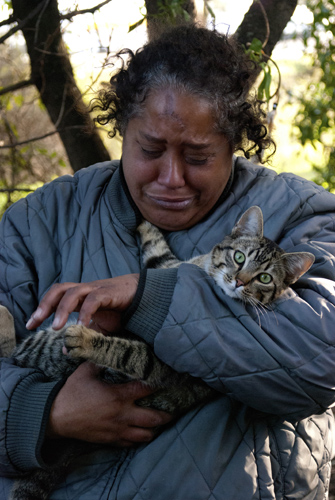
Irma Garcia holds her cat “Joey” on Tuesday (Feb.14) in South San Francisco and begins to cry as she mentions how the raccoons living around her campsite are constantly attacking her cat. She says she worries they will hurt Joey. Photos by Jessica Worthington.
August 6, 2012
She looks away, lowering her head and letting her hands fall limply to her sides. Slowly, she raises her head and with tears welling up in her eyes she answers the question.
“Dead,” she says. “Dead in a grave somewhere…that’s where I see myself in five years.”
She holds my soft hands in her own, rough and weathered.
For the past three years, Irma Garcia has been battling far more than homelessness on the streets of South San Francisco. Garcia struggles with mental illness, including severe depression. Her greatest challenge, however, is the lack of a support system.
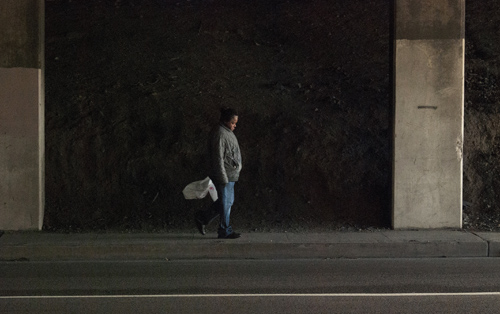
Irma Garcia walks under an overpass in South San Francisco on Tuesday (Feb.14) heading back to her campsite to feed her 7-month-old cat she named “Joey”.
“I’m getting old, too old to be living on the streets, but what are my options?” she says. “There’s no one around willing to help me and I can’t do it on my own—I’ve tried.”
Our relationship began as a fairly routine photo assignment. I went in search for a subject—a homeless woman. I didn’t have to go far.
As our rapport developed, she told me about years of sexual abuse.
“I was the ‘bad seed’ growing up,” she said. “I was sexually abused by a trusted family member for years and when I finally spoke out; my mother slapped me across the face so hard, I bled.”
Even before Garcia ended up on the streets three years ago, she lacked a support system. At 15, she was raped by a man who lied to her about his age. Two months later she found out she was pregnant and left her parents house in search for him. Ten years of physical abuse and four children later, she wound up in multiple women’s shelters waiting for section 8 housing.

Irma Garcia, 45, visits the Library in South San Francisco on Tuesday (Feb.28). She logs on to her Facebook and looks through pictures of herself from four years ago when she was in a much better situation and not living on the streets. “This is when I had teeth” says Garcia.
“I failed them as a parent,” Garcia said. “I didn’t do it right, but I never laid a hand on any of them—I didn’t want them to have the childhood I had.”
She tells me that her family wants nothing to do with her until she stops drinking and gets the help she needs.
“I had a nervous breakdown,” said Garcia. “I used to work for a program in South San Francisco that did outreach to the homeless. I took classes at Skyline College to get the job and made 16 bucks an hour—you think I wanted to give that up?”
Garcia recounts continuous conflict with her partner on the job as the trigger to her nervous breakdown.
“I didn’t have a car. I took the bus to meet her and ride along to where we needed to go. I was always early, sometimes an hour early—but that’s the bus system. She told my boss that she waited for me and I never showed up. She never waited though, and no one believed me.”
Garcia says that she was watching her job fall apart.
“I went and bought a small bottle of alcohol and headed to the park. She had stood me up again that day and lied about it. I sat in a swing and drank it. Then, I looked down by my feet and saw a broken bottle. I thought ‘I’m done with this life, I don’t want it anymore’ and that’s when I did it.”
The police found her at the park with her wrists slit. She was taken to a hospital in Vallejo and held for 25 days as a 51/50 patient and then released.

The campsite in South San Francisco where Irma Garcia, 45, has been living for the past three years.
“I’m still trying to figure out why I’m here, but God must not be ready for me.”
She was diagnosed with ADHD, extreme depression, bipolar disorder, and multiple personality disorder.
“They told me my brain waves were not right,” said Garcia. “They give me pills once a month and that’s the extent of my care.”
Garcia was prescribed Abilify, Celexa and Trazodone.
Garcia also struggles with alcoholism—her form of self-medicating. Fifty percent of the mentally ill homeless population in the United States suffers from substance abuse and dependence, according to the Substance Abuse and Mental Health Services Administration (SAMHSA).
“She’s got a big heart— always wanting to help other people, but this lead to people taking advantage of her,” said Tony Alvarado, South San Francisco Police Officer. “People broke into her home and stole from her on numerous occasions.”
Garcia was evicted from her apartment for taking in too many people. Within 30 days, she headed to a liquor store and then a bench. That’s where Sam, a homeless man, found her. It was pouring rain.
“Sam [with whom Garcia is still living] saw me and he said, “I have a little tent”.
The scope of the problem
Each year, 3.5 million people experience homelessness and of this statistic, 22 percent suffer from a mental illness, according to SAMHSA.
Garcia is one of 770,000 homeless people in the U.S. suffering from a mental illness.
Only 20 percent of the mentally ill, unsheltered, homeless in San Mateo County are accessing mental health services, according to the 2011 San Mateo County Homeless Census and Survey. Therefore, 80 percent of mentally ill people in San Mateo County are not getting the help they need. Why is that?
Laura’s Law, a California state law passed in 2002, allows for court-ordered assisted outpatient treatment for the severely mentally ill. To qualify, the person must have a recent history of psychiatric hospitalizations, jailings, or threats or attempts of serious violent behavior towards [self] or others. However, the statute can only be utilized in counties that choose to enact outpatient services based on the measure. To date Nevada County is the only county that has fully implemented Laura’s Law.
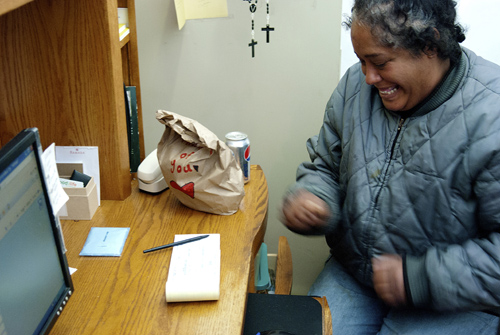
Irma Garcia, 45, who has been homeless for three years on the streets of South San Francisco, is given a clothing voucher for 25 dollars to spend at the St. Vincent de Paul Society’s Thrift Store on Tuesday (Feb.14). The Hospitality Room inside St. Vincent de Paul is where Garcia can pick up her mail and any toiletries and undergarments she needs.
In the first two-and-a-half years, the county has saved more than $500,000 by avoiding hospitalizations and incarcerations, according to a report written by its civil grand jury.
Back in 2004, Los Angeles County implemented this law on a limited basis.
It’s only operative if the county board of supervisors authorizes its application and finds that no other mental health programs already in place will be reduced from funding this program. However, if this program has proven to save money, then why after 10 years of it being in place has only one county in California been using it in its entirety?
Proposition 63, the so-called “millionaire’s tax,” which was passed in 2004 after decades of mental health cuts, was designed to help mentally ill residents like Irma Garcia. In 2005, the proposition was revised to allow funds to be used for “involuntary services”. Seven years later, only Nevada and Los Angeles counties are utilizing Laura’s Law funds.
San Francisco was considering adopting the proposal back in 2010, but instead postponed the action. Against the law was former San Francisco Public Health Director Mitch Katz. He said he believes that it offers no potential for effective treatment because it doesn’t make it easier to forcibly administer drugs.
However, this is no longer a debate on effectiveness. There is a visible record of progress that Nevada County has demonstrated. Its success can no longer be denied, nor can lack of funds be justification for choosing to not implement this law.
Tom Anderson, Superior Court judge in charge of Nevada County’s program, suggests that the opposition to Laura’s Law by county health departments throughout California is due to the accountability that would be placed on these departments by the courts for providing treatment they promise.
State legislation authorizing Laura’s Law is set to expire at the end of this year. If Assembly Bill 1569 is passed by the Legislature and signed into law by Gov. Jerry Brown, Laura’s Law will remain in effect for six more years. If not, Laura’s Law can no longer be applied in California.
“What are my three wishes?” said Garcia. “Well, to see my children, peace on earth, and help—the kind of help that doesn’t give up because there’s nothing about this life that I prefer.”
More Photos
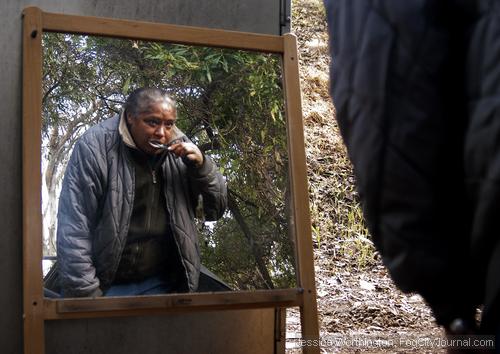
Irma Garcia,45, looks into her mirror she has recently found from an old baby crib and brushes her teeth on Tuesday in South San Francisco. She says that it is important for her to brush her teeth and keep up her appearance.
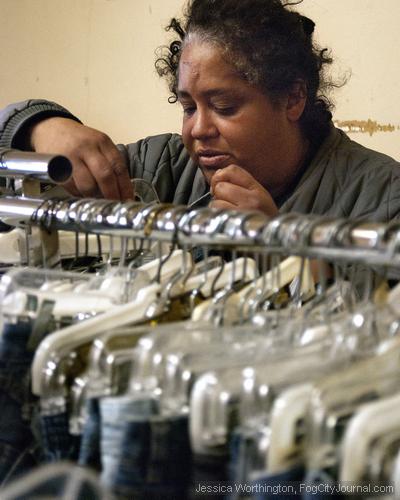
Irma Garcia looks through the clothing racks at St. Vincent de Paul Society’s Thrift Store located in South San Francisco. She was given a 25 dollar clothing voucher on Tuesday (Feb. 14) from Lisa Collins, director of the Homeless Help Center, because she cannot afford to purchase clothes at this time.
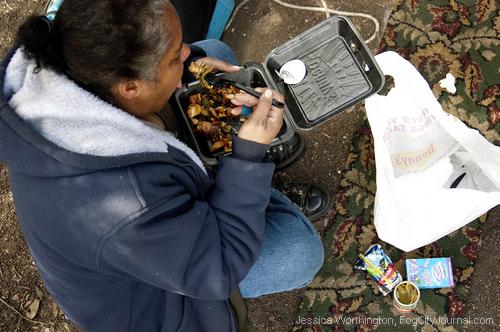
Irma Garcia, 45, sits down to enjoy her free lunch from a waitress at Denny’s on Tuesday (Feb.28). Garcia states that the waitress is very kind and has told Garcia that she is a very nice person and would like to help her out as much as she can.
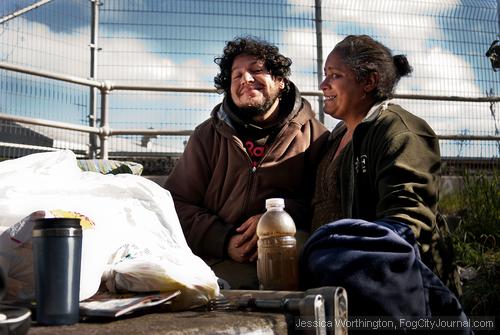
Irma Garcia, 45, enjoys a quick chat with her friend (name not given) on Tuesday (Feb.28) in South San Francisco. Garcia says that she knows a lot of people and has few enemies, which is how you get by when you live on the streets.

A dreamcatcher hangs from a tree in Irma Garcia’s campsite in South San Francisco on Tuesday (Feb.28). Garcia believes that the dreamcatcher brings her good luck and often talks about the movie “Dreamcatcher” and how it’s one of her favorites.
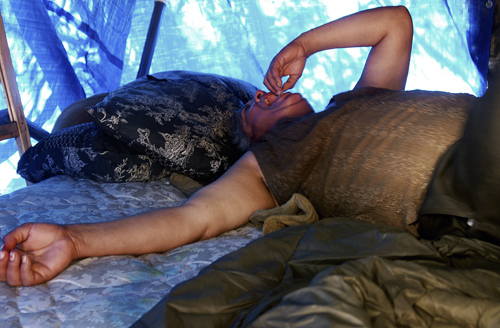
Irma Garcia, 45, screams inside of her tent last Tues. (July 24) after drinking heavily. Garcia is a homeless woman who resides in South San Francisco.
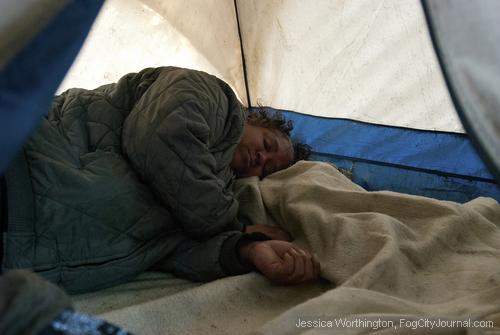
Late afternoon on Tuesday (Feb.14), Irma Garcia crawls into her tent that she and her boyfriend Sam set up beside an overpass in South San Francisco. She states that she is drunk, her feet ache from walking all day, and that she needs to rest.


 The Hunger Site
The Hunger Site
September 21, 2012 at 6:58 pm
Continue to dream help is on the way there is always hope. Thank you for your concern, The more we connect the the lighter the load of the srtuggle becomes. Another World Is Possible, and I believe Inevetable.
August 8, 2012 at 2:51 pm
this system is so wack. they cant even help the people who need help. So many other people abuse the system and the people who need it cant even get it. Wake up USA you need to help out the people who need it and have people watch them make the right choices to get them back on the right track. I know its hard. Me and my family were homless twice back in the 90s. Some people dont want help but some do. Its their choice but also you cant live in california for 8 bucks an hr.
August 7, 2012 at 6:55 am
In many instances, the mentally ill cannot make a choice. Laura’s Law allows court-ordered, 180-day intensive outpatient treatment under supervision of the court for people with severe mental illnesses who refuse medication because their illness impairs their ability to make rational decisions. Laura’s Law provides safeguards to protect their civil rights. There is nothing involuntary in Laura’s Law. The alternative is to let these unfortunate persons wander the streets, unable to care for themselves.
August 6, 2012 at 7:28 pm
Bless you, Jessica… and bless Irma. Someone needs to help her because the mental health system certainly is not. Pass Laura’s Law
August 6, 2012 at 10:57 am
The American Civil Liberties Union is opposed to Laura’s Law. They believe choice is essential to recovery and coercive treatment is ultimately ineffective. You won’t get SF to implement until the ACLU changes it’s opinion.